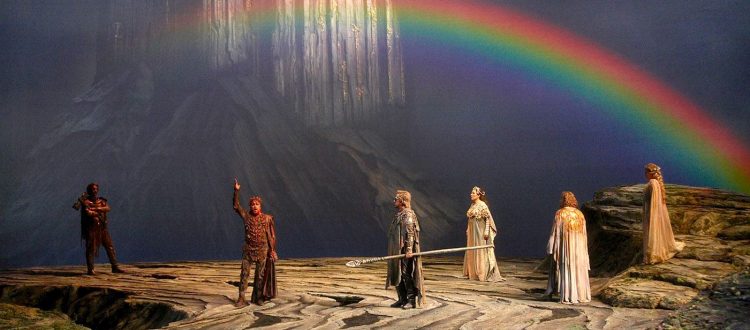Lisbon Goethe-Institut Conferences: Paulo Ferreira de Castro
AUTUMN CYCLE – OCTOBER / NOVEMBER 2018
WAGNER IN SCENE
A series of three sessions dedicated to the story of the staging of Richard Wagner’s work, by Paulo Ferreira de Castro (NOVA FCSH).
All sessions will be abundantly illustrated with audiovisual examples, and are intended for the general public.
30.10.2018 | 6:30 pm | CONFERENCE
1. Richard Wagner’s work as a theatrical challenge
In addition to its properly musical dimension, Richard Wagner’s work has always been a powerful stimulus to innovation in the field of staging, pushing the technical possibilities of the theater of his time to the limit and giving rise to new ways of thinking about the music-theatrical show in its wholeness.
The first session dedicated to the theme will focus on how Wagner’s creation develops from 19th century theatrical practices, and on how the tradition established in Bayreuth theater from the first Festival (1876) comes into confrontation with modern trends in staging developed in Europe since the beginning of the 20th century, giving rise to the first attempts to break with the Bayreuthian orthodoxy.
Free entry. Goethe-Institut, Lisbon
13.11.2018 | 6:30 pm | CONFERENCE
2. Exorcisms: from the “new Bayreuth” to the Regietheater
After the fall of the Nazi regime, and under the impetus of Wieland Wagner, the Bayreuth Festival undertook a radical renewal of its aesthetics, tending to a greater visual abstraction and the incorporation of interpretative proposals in rupture with tradition, which is not strange Stunde Null’s inherent desire for depoliticization in Germany (“zero hour”) and the identity crisis that followed the outcome of World War II.
At the same time, from the 1960s onwards, the joint influence of scenic realism and Brechtian dramaturgy will decisively mark the ways of thinking about opera staging in the context of the German Democratic Republic, with the emergence of emblematic figures such as Walter Felsenstein, Joachim Herz, Ruth Berghaus, Götz Friedrich and Harry Kupfer, whose action will have global repercussions. The second session dedicated to the theme will try to put in perspective the dominant currents in the Wagnerian staging in the 50-70s, without forgetting the production of the Festival’s centenary signed by Patrice Chéreau.
Free entry. Goethe-Institut, Lisbon
27.11.2018 | 6:30 pm | CONFERENCE
3. Fidelity or recreation, deconstruction or over-interpretation?
In the third session dedicated to the history of the staging of the Wagnerian work, several achievements of the last decades will be discussed and analyzed, as a starting point for a critical debate, extended to the public, on the most relevant interpretative trends today, their aesthetic, technical assumptions and conceptual, and also their deadlocks and paradoxes. What can be expected from the transformations of the Wagnerian staging, inside and outside the Bayreuth Festival? And how to think about the “work of art of the future” in the post-everything era?
Free entry. Goethe-Institut, Lisbon
Paulo Ferreira de Castro is a musicologist and professor in the Department of Musical Sciences at Universidade Nova de Lisboa. He performed music criticism in several media and was Director of the Teatro Nacional de São Carlos. He is the author of several books and essays on European music from the 18th to the 21st centuries, with a prominent place for Wagnerian themes, having participated in the collective volume The Legacy of Richard Wagner (Brepols Publishers, 2012).

